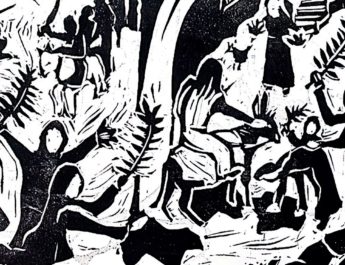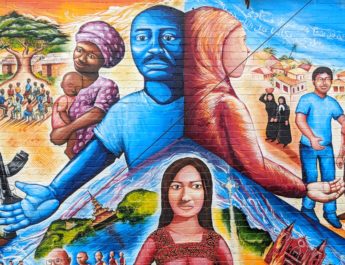Isaiah 52:7-10
Christmas Day ABC
7 How beautifulA upon the mountains
are the feet of the messengerB who announcesC peace,D
who brings goodE news,F
who announces salvation,G
who says to Zion,H “Your GodI reigns.”J
8 Listen! Your sentinelsK lift up their voices,
together they sing for joy;
for in plain sightL they see
the returnM of the LordN to Zion.
A “beautiful” = naah. 3x in OT. Properly, this is to be at home, which implies something that is pleasant, lovely, fitting, or suitable.
B “messenger” = basar. Properly, this is to be fresh i.e. full or rosy. Figuratively it means to be cheerful, which leads to the idea of announcing glad news. So, this word is to bear tidings, bring, carry, preach, to be a messenger.
C “announces” = shama. This is to hear, call, consent, or consider. It implies listening intelligently, giving attention, and, because of these two factors, obedience and action are often implied. In this passage, the word is in the Hiphil tense (which means to take the normal meaning of the word and add “to cause to ________.”). Hence, announce (i.e. “cause to hear/attend/act.”)
D “peace” = shalom. From shalam (to be complete or sound; to have safety mentally, physically, or extending to one’s estate; so, if these things are safe and complete, the implication is that one would be friendly; and, if being friendly, one would make amends and that friendship would be reciprocated). This is completeness, soundness, welfare, favor, friend, good health. It is to be safe and figuratively well, happy, at peace, friendly. Abstractly, it includes the ideas of welfare and prosperity (not in excessive wealth, but in having enough).
E “good” = tob. This is good, beautiful, pleasant, agreeable, bountiful, at ease. This word is used for goodness as a concept, a good thing, a good person. This can refer to prosperity and welfare as well as joy, kindness, sweetness, and graciousness. So, this is ethically good, but also enjoyably good.
F “brings…news” = basar. Same as “messenger” in v7.
G “salvation” = yeshuah. From yasha (to deliver, defend, help, preserve, rescue, be safe. Properly, to be open, wide or free, which implies being safe. Used causatively, it means to free). This is salvation, deliverance, health, victory, prosperity.
H “Zion” = tsiyyon. The word is related to tsyiyyun (signpost, monument); from tsavah (to charge someone, to command, order); from the same as tsiyyah (dryness drought); from a root meaning parched as desert, dry land. Zion can refer to a mountain in Jerusalem as well as another name for Jerusalem itself or the people.
I “God” = Elohim.
J “reigns” = malak. To be or become king or queen, to rise to the throne, to be crowned. By implication, to take counsel. This word may be from the Hebrew word for king “melek” or vice versa.
K “sentinels” = tsaphah. Properly, this describes leaning forward as one does to look far of. It implies observing, keeping watch, or waiting expectantly. This can also mean to look around, to spy, or to be a watchman.
L “in plain sight” = ayin + ayin. Literally “eye to eye.”
M “return” = shub. To turn back, return, turn away – literally or figuratively. Doesn’t necessarily imply going back to where you started from. This is also the root verb for the Hebrew word for repentance “teshubah.”
N “Lord” = YHVH. From havah (to be, become) or hayah (to come to pass, become, be). This is the name of the God of Israel, the self-existent and eternal one, the tetragrammaton. This pronunciation has been lost to time so “Lord” is generally used in its place.
9 Break forth together into singing,
you ruinsO of Jerusalem;P
for the Lord has comfortedQ his people,
he has redeemedR Jerusalem.
10 The Lord has baredS his holyT armU
before the eyes of all the nations;
and all the ends of the earth shall see
the salvation of our God.
O “ruins” = chorbah. From chareb (to be waste or desolate; as a noun, destroyer, devastator). This is properly a drought and so it implies desolation, waste, ruin, desert, a place that is decayed.
P “Jerusalem” = yerushalaim. From yarah (to throw, shoot, be stunned; to flow as water so figuratively to instruct or teach) + shalem (to make amends, to be complete or sound). This is Jerusalem, dwelling of peace.
Q “comforted” = nacham. Properly, this is a strong breath or a sigh. This can be to be sorry, to pity, console. Comfort, or repent. But, one can also comfort oneself with less righteous thoughts, so this can also mean to avenge oneself.
R “redeemed” = gaal. This is to redeem someone or something according to kinship laws. So, it could be acting on a relative’s behalf to buy back their property, to marry one’s brother’s widow, etc. This could be more briefly translated as to redeem, acts as kinsman, or purchase. As a noun, it could be deliverer or avenger.
S “bared” = chasaph. 11x in OT. This is to strip off, to bare, uncover, or discover. Most commonly associated with baring oneself due to exertion of as a disgrace (as when taken captive and stripped). This can also mean to skim or scoop – to draw water from the surface.
T “holy” = qodesh. This is set apart and so sacred. God is different from us and so God is holy/set apart. Things we dedicate to God’s service are set apart for God and so they, too, are holy, etc.
U “arm” = zeroa. Perhaps from zara (to sow, scatter seed, conceive). This is the arm, shoulder, or foreleg of an animal. It is figuratively used for power, force, might, or help.
“Freedom” by SidneyLaShay is licensed under CC BY-NC-SA 2.0




